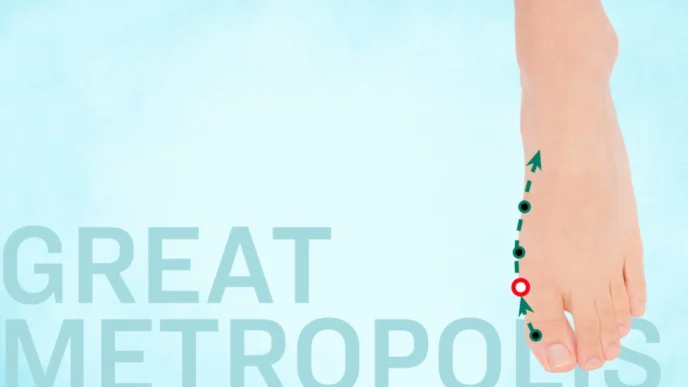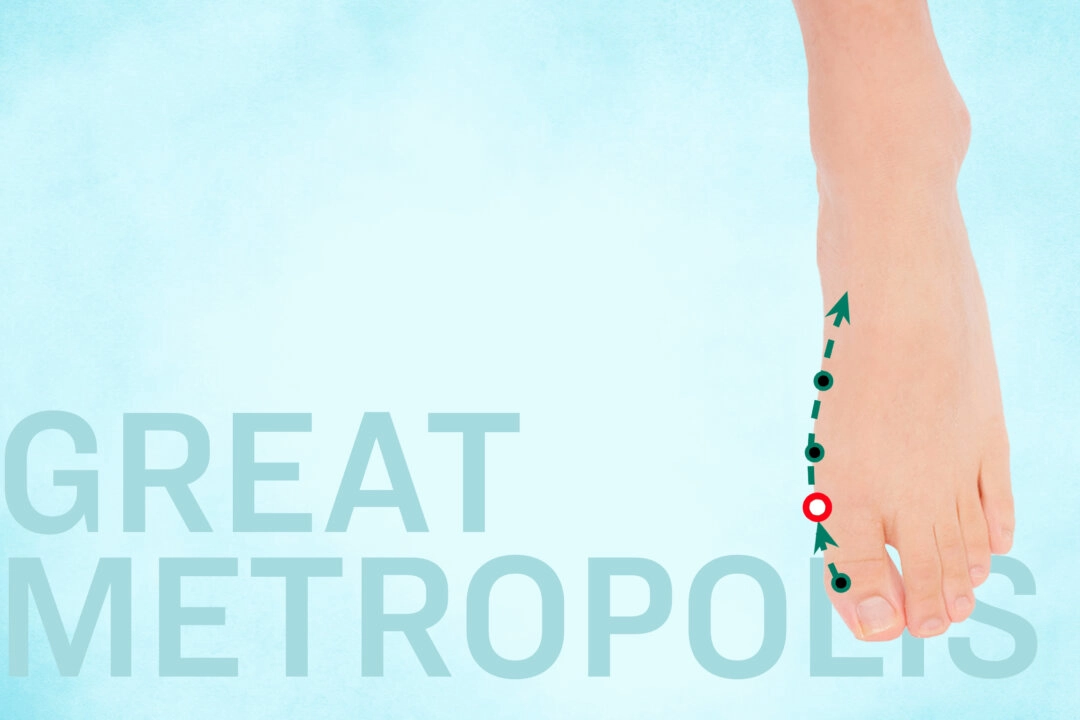Depression is more than a buzzword—it’s a growing global health concern. While research results vary depending on region and demographics, one thing is clear: Depression is complex, doesn’t always respond to conventional treatment, and is often underdiagnosed in older adults, with symptoms brushed off as “just aging.”
Traditional Chinese medicine (TCM), however, sees emotional and physical health as deeply connected—and addresses both at once. Great Metropolis (Da Du, SP2), a widely used acupoint on the side of the foot, plays a notable role in supporting emotional and digestive well-being.
What’s Special About Da Du?
Da Du was first recorded in the “Ling Shu” (“Spiritual Pivot”), one of the foundational texts of TCM on acupuncture theory. It’s classified as a Ying-Spring point, meaning its unique ability is to clear “heat” from its corresponding meridian—in this case, the spleen.
In TCM, heat is seen as a disruptive, damaging force that leads to various symptoms ranging from swelling to pain to fever. Oftentimes, heat can be interpreted similarly to inflammation in Western medicine. Due to the holistic nature of TCM, the spleen is tied not only to digestion but also to emotional regulation, particularly worry and overthinking, and regulating the flow of energy in the Spleen meridian can positively impact mood.
Practical Applications of Da Du
Da Du is particularly effective for inflammation of the digestive tract, whether chronic or acute. This includes issues such as bloating, gastric pain, and diarrhea. What makes Da Du especially notable is its ability to help regulate mood, which is why it is included in treatment protocols for depression, including postpartum depression, where the imbalances manifest as low mood, persistent negative thoughts, low energy, and worry, rather than anger or aggression.
This dual action—supporting both gut health and mental well-being—aligns with emerging research on the gut-brain connection and the role inflammation may play in both depression and digestive disorders.
Backed by Clinical Evidence
Modern research is exploring the potential of acupuncture to provide multi-layered support for complex conditions. A clinical study explored how acupuncture at acupoints on the lower limbs—including Da Du—could improve symptoms in patients with Type-2 diabetic peripheral neuropathy, in which high blood sugar levels damage the nerves responsible for sending signals between the central nervous system and the rest of the body.
The study involved 60 patients split into two groups: one received standard care, while the other also received an acupuncture protocol that included Da Du, along with several other points, three times a week over four weeks. The results were compelling: Those in the acupuncture group saw greater improvements in pain, nerve function, and traditional symptom scores. Although inflammatory marker levels like TNF-α did not differ significantly between the two groups, the overall treatment effectiveness rate was much higher in the acupuncture group at 76.7 percent versus 33.3 percent. The findings suggest that including acupuncture at targeted points may offer significant therapeutic benefits.
How to Locate and Stimulate Da Du
You’ll find Da Du on the inner side of your big toe, just below and slightly in front of the joint where your toe meets the foot. Look for the line where the tougher skin of the sole meets the softer skin of the top of the foot. Gently press around to find a spot that feels sore or tender to touch.
Simple Ways to Stimulate the Point
To start working with Da Du, consider the following methods:
- Firm pressing: Use your thumb, the blunt end of a pen, or a toothpick to press down for three to five seconds, then relax. Repeat for one to three minutes per side.
- Circular massage: Massage in gentle circles with your index finger or thumb for up to three minutes.
- Herbal patch: You can apply an overnight herbal patch for longer stimulation.
- Professional options: For deeper activation, try acupuncture or moxibustion with a trained practitioner.
Always notice how your body responds to acupressure and adjust the intensity to find the perfect balance between activation and comfort.
Precautions
Avoid this point if there are injuries, cuts, or infections in the area. If you’re using an herbal patch, avoid harsh chemical ingredients, especially if you have sensitive skin.
A Practical Addition to Your Wellness Toolkit
If you’re someone with a sensitive stomach or if you tend to carry your stress in your gut, Da Du is a point worth getting familiar with. Its ability to calm inflammation while supporting emotional regulation makes it an accessible and practical self-care tool.
In the face of rising rates of depression and lack of universally effective standard treatments, every method counts.
TCM expert Shihhsiang Hung reviewed this article for accuracy and clarity.
Originally published in Epoch Times on 4 June 2025























